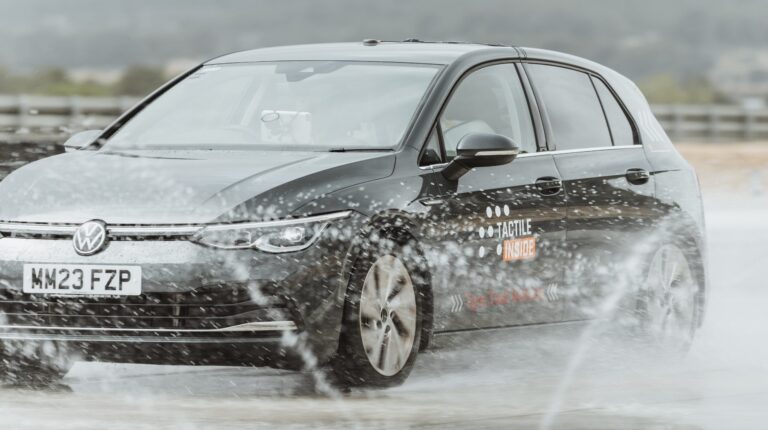As advanced driver assistance systems (ADAS) and autonomous vehicle technologies continue to evolve, the need for smarter, more responsive tires is accelerating. For SUVs in particular, this evolution is critical.
Why SUVs? Heavier weight, higher center of gravity and varied driving conditions on and off road all contribute to faster wear. Meanwhile, consumer expectations around safety, ride quality and efficiency are rising. To meet these demands, manufacturers are looking for ways to make tires last longer without compromising performance.
Smart tire technology
Traditional tires weren’t built for the demands placed on them by today’s SUVs. Between heavier curb weights, mixed-use driving and a higher likelihood of off-road travel or towing, SUV tires face more wear than those on smaller vehicles. Yet until recently, tire health has largely been tracked through manual inspections or reactive low-pressure alerts – tools that often catch problems only after performance has already declined.
Smart tires aim to close that gap. Embedded with sensors and powered by machine learning, these tires continuously assess their condition and send real-time performance data to the vehicle’s control systems. For SUVs, this means more accurate monitoring under challenging conditions, such as sudden elevation changes, sharp turns on mountain roads, and transitions from paved streets to gravel or mud.
This is where tire intelligence enters the picture. Unlike traditional tire pressure monitoring systems that offer only basic air pressure readings, smart tires provide multidimensional insights – tread wear, grip levels, temperature changes and road texture among them. That kind of granular feedback helps SUV systems adjust suspension, braking and power delivery to keep vehicles stable on uneven terrain or during high-load situations.
A new wave of virtual sensors is also transforming how vehicles understand tire and road dynamics, without adding any hardware to the tire itself. By applying AI and machine learning to data from existing sensors, these systems estimate critical variables like vehicle weight, load distribution and road grip in real time. This allows SUVs to adapt braking, stability and handling to changing conditions such as towing, wet roads or uneven terrain. Instead of measuring pressure alone, tires become intelligent agents, interpreting how the vehicle feels and responds to the world beneath it.
These intelligent systems monitor variables that are especially relevant to SUV use: vertical load from towing or cargo, lateral forces during cornering, and real-time friction on unpredictable surfaces.
Sensor fusion and machine learning
Smart tire technology is a cornerstone of a broader shift in vehicle perception – one that goes beyond sight and sound to include touch and feel. This is made possible through sensor fusion – the integration of data from multiple sources including smart tires, optical cameras, accelerometers and vehicle control systems.
This multilayered approach enables the vehicle to interpret the road surface in real time with far greater sensitivity. For SUVs, which often navigate uneven terrain or carry varying loads, this level of precision can make a meaningful difference in ride stability and handling. Much like a human driver senses traction loss through subtle vibrations or tire feedback, sensor fusion allows the vehicle to recognize minute changes in friction, surface texture and dynamic load transfer – all of which are especially relevant when driving a heavier, taller vehicle.
When powered by machine learning, this fusion of sensory inputs becomes even more powerful. Algorithms can detect early warning signs of tire degradation, uneven wear or compromised grip – often before these issues are visible or noticeable to the driver. For SUV drivers who may be towing trailers or venturing off paved roads, that early insight helps prevent problems before they arise. Deviations in friction profiles, for instance, can signal misalignment, under-inflation or overloading – all common challenges in SUV use cases – and prompt timely maintenance alerts.
Beyond performance, intelligent tire systems contribute to broader safety and environmental goals. A smarter tire can help a vehicle adapt braking and steering algorithms based on actual grip conditions, particularly in poor weather. This added responsiveness is especially valuable for SUVs, which are more prone to rollover risks and require more nuanced stability controls. And by optimizing tire use, manufacturers can reduce waste and extend the lifecycle of each tire – a practical sustainability gain for SUV fleets and individual owners alike.
A roadmap for the SUV era
Smarter tires are doing more than helping SUVs perform better – they’re changing how these vehicles are engineered, driven and maintained. As SUV designs continue to evolve, manufacturers are already exploring how tire intelligence can influence everything from suspension calibration to predictive maintenance systems. The tire is no longer just a wear item; it’s becoming a strategic input into how the vehicle operates.
For fleet operators and individual drivers alike, that shift opens up new possibilities. Smart tire data can inform load management for delivery SUVs, support energy optimization in hybrid or electric models, and even enhance over-the-air updates for vehicle-handling software. As more SUVs enter the market across urban, suburban and off-road categories, the ability to adapt tire behavior to specific use cases – and gather insights from real-world conditions – will be a powerful differentiator.
In this next phase of SUV development, tires aren’t just supporting the vehicle’s performance – they’re helping define it.
) Posted originally on: www.tiretechnologyinternational.com
Posted originally on: www.tiretechnologyinternational.com



